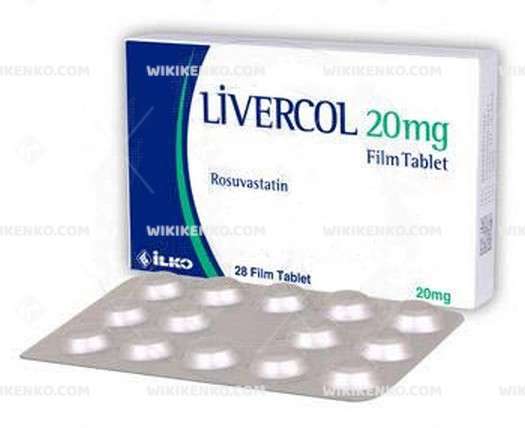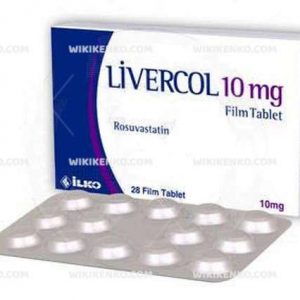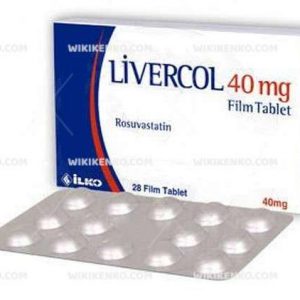Livercol Film Tablet 20 Mg
Livercol Film Tablet 20 Mg belongs to the group of drugs known as “statins.” It is a medication used to correct the levels of lipids, which are fat substances found in the blood. One of the most well-known lipids in the blood is cholesterol, which comes in different types, including ‘bad’ cholesterol (LDL-C) and ‘good’ cholesterol (HDL-C). Livercol effectively reduces ‘bad’ cholesterol levels and can increase ‘good’ cholesterol levels.
| Dosage form | |
|---|---|
| Pack size | |
| Potency | 20 Mg |
| Manufacturer | Ilko |
| Origin | Turkey |
| Generic Name (Ingredient) | Each Tablet; 20 Mg Of Rosuvastatin Equivalent To 20 Mg Rosuvastatin Contains Calcium. |
Assuming your emergency circumstances for this product, visit Urgent Quotation page. Besides, for any pharmaceutical questions, please ask us in the comments section.
Description
Understanding Livercol Film Tablet
Livercol tablets are round, pink, and unnotched film-coated tablets, available in blister packs containing 28 and 90 tablets. Physicians may prescribe it when cholesterol levels are found to be high, putting the patient at risk of heart attack or stroke. If lifestyle changes such as diet and exercise are not sufficient to correct cholesterol levels, it may be prescribed as a therapeutic intervention.
While taking Livercol, it is essential to maintain a cholesterol-lowering diet and exercise regimen. Additionally, certain individuals may have other factors that increase their risk of heart attack, stroke, or related health problems.
These conditions often result from atherosclerosis, a disease characterized by the accumulation of fatty deposits in blood vessels. Livercol plays a vital role in correcting lipid levels, thereby contributing to the management of atherosclerosis.
Ingredients
Livercol contains the active ingredient Rosuvastatin, which functions as a selective and competitive inhibitor of HMG-CoA reductase. This action increases hepatic LDL receptors’ presence on the cell surface, enhancing the uptake and breakdown of LDL, and inhibits the hepatic synthesis of VLDL, ultimately reducing the total number of VLDL and LDL particles.
In addition to the active ingredient, Livercol also contains several inactive ingredients, including tribasic calcium phosphate, microcrystalline cellulose (PH 102), butylated hydroxytoluene, povidone K-30, croscarmellose sodium, colloidal silicon dioxide, magnesium stearate, Instacoat universal white IH, purified water, and titanium dioxide for coloration.
Dosage and Administration
The usual dosage of Livercol is 10-40 mg, taken orally once a day. The specific dosage should be individualized based on the patient’s therapy goals and response to treatment. The majority of patients achieve adequate control at the starting dose. However, if necessary, dose adjustments can be made at 2 to 4 week intervals. it can be taken at any time of day, with or without food.
To ensure the most effective treatment, it is crucial to adhere to your doctor’s instructions regarding the dosage and administration of Livercol. Your healthcare professional will determine the appropriate dose based on your unique needs and medical history.
Side Effects
As with any medication, Livercol may cause side effects in some individuals. Typically, these side effects are mild and transient. If you experience any severe reactions, seek immediate medical attention or visit the nearest hospital emergency department. Such severe reactions may include:
- Swelling of the face, lips, tongue, and/or throat with or without difficulty breathing
- Swelling of the face, lips, tongue, and/or throat with difficulty swallowing
- Severe itching with skin bumps
Unusual or persistent muscle pain or discomfort should also be reported to your doctor immediately. Muscle symptoms are more commonly observed in children and adolescents than in adults. While the occurrence of uncomfortable muscle effects is rare, it is essential to monitor and address them promptly, as they can potentially progress to a serious condition called rhabdomyolysis.
Common Side Effects
Livercol’s common side effects may include headache, stomach pain, constipation, nausea, muscle pain, weakness, dizziness, and an increase in protein in the urine (only for Livercol 40 mg).
Remember that discussing potential side effects with your doctor or a healthcare professional provides accurate information and helps you make informed decisions about your treatment.
Conclusion
Livercol Film Tablet 20 Mg is a valuable medication in managing cholesterol and correcting lipid levels. As part of the statin group, it plays a crucial role in reducing ‘bad’ cholesterol and increasing ‘good’ cholesterol. Taking it as prescribed by your doctor, along with maintaining a cholesterol-lowering diet and exercise routine, can significantly contribute to your heart health and overall well-being.
Use the form below to report an error
Please answer the questions as thoroughly and accurately as possible. Your answers will help us better understand what kind of mistakes happen, why and where they happen, and in the end the purpose is to build a better archive to guide researchers and professionals around the world.
The information on this page is not intended to be a substitute for professional medical advice, diagnosis, or treatment. always seek the advice for your physician or another qualified health provider with any questions you may have regarding a medical condition. Always remember to
- Ask your own doctor for medical advice.
- Names, brands, and dosage may differ between countries.
- When not feeling well, or experiencing side effects always contact your own doctor.
Cyberchondria
The truth is that when we’re sick, or worried about getting sick, the internet won’t help.
According to Wikipedia, cyberchondria is a mental disorder consisting in the desire to independently make a diagnosis based on the symptoms of diseases described on Internet sites.
Why you can't look for symptoms on the Internet
If diagnoses could be made simply from a textbook or an article on a website, we would all be doctors and treat ourselves. Nothing can replace the experience and knowledge of specially trained people. As in any field, in medicine there are unscrupulous specialists, differences of opinion, inaccurate diagnoses and incorrect test results.





Reviews
There are no reviews yet.